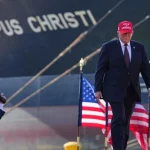
–>
August 28, 2022
In response to the long-planned Taiwan visit by the U.S. House Speaker Nancy Pelosi, China once again flexed its trade muscle to show Taiwan who is dominant in the cross-strait relationship, using both intimidation and retribution to halt imports of food from Taiwan.
Taiwan has been under China’s economic, political, and military threats for at least a decade. How did Taiwan get itself into this situation, and what is the way out?
From hostility to integration
After winning the civil war in 1949, the Chinese Communist Party changed the nation’s name from the Republic of China to the People’s Republic of China (PRC, or China). The defeated ROC government retreated to Taiwan, keeping ROC as the official name of the self-ruled island.
As China began its economic reform in 1978, the Chinese government appealed to Taiwan in 1979 to open up direct contact channels. The two-way contact was completely established in 2008, marking the end of hostility between the two sides of the Taiwan Strait.
China, longing for foreign capitals for economic recovery, unveiled a series of incentive policies, ranging from tax exemption to free land use. Entrepreneurs in Taiwan became one of the first and largest foreign investors to enter China in the 1980-1990 era. Taiwan’s cumulative investment in China climbed to 56% of Taiwan’s total outward investment by 2019. As of May 2021, Taiwan’s cumulative investment in China has reached U.S. $193 billion with a total of more than 44,000 projects.
Along with the growth of Taiwanese investment in China, is the rapid pickup of Taiwan-China trade activities. In 2020, the volume of two-way trade was U.S. $166 billion, and China accounted for 29% and 22% of Taiwan’s total exports and imports, respectively, surpassing Taiwan’s trade volumes with the U.S.
Economic integration poses risks for Taiwan
There is no doubt that China is the biggest economic beneficiary of the Taiwan-China economic integration. However, China has its unspoken agenda: using Taiwan’s business community as advocates for its political goal, namely, bringing Taiwan under China’s communist control. By integrating Taiwan with China economically, China has put Taiwan in a disadvantaged position as explained below.
Economic vulnerability
China’s uncertainty in economic policy, absence of rule-of-law, and unpredictability of nationalism-swung public attitudes have always been real threats to foreign investments. Given the sensitivity of Taiwan’s sovereignty status, Taiwanese businesses face more potential hostility than those from the West. Worse still, Taiwan’s lack of official recognition by international communities leaves Taiwanese businesses in China unprotected by international laws.
Political pressure
As Taiwanese entrepreneurs have learned quickly what their Chinese host has planned for Taiwan, they would be eager to lobby — either voluntarily or under pressure — for the Taiwanese government to adopt China-first, Taiwan-last policies.
The “peace approach” advocated by the owner of Foxconn illustrates this business-oriented political pressure. Foxconn is the world’s largest manufacturer of electronics components, with more than half million employees working in China. During his 2019 primary campaign for the Taiwanese presidency, Terry Gou told the public that he opposed Taiwan’s arms purchase from the U.S., reasoning that “if you do not have weapons, [China] would not attack”.
Gou’s approach, although practical for Taiwanese businesses operating in China, is not in Taiwan’s best interest as a sovereign state.
Blackmail
China has never hesitated to deploy hostage diplomacy in its international dealings. Numerous foreign enterprises operating in China have been targeted by the Chinese government over political motivations. China banned salmon imports from Norway after a Chinese dissident was given the Nobel Peace Prize, it banned coal imports from Australia after Canberra called for an investigation into the origin of the COVID-19 virus, and it banned fruit imports from Taiwan when the cross-Strait tension rose.
Other international corporations punished by China for apparent political reasons include 7-Eleven in 2021, a group of Japanese auto parts manufacturers in 2014, a wide range of South Korean industries since 2016, and the French supermarket chain Carrefour in 2008. The latest big name corporation falling victim to China’s political coercion is the Taiwanese conglomerate Far East Group for its alleged support of Taiwan’s independence.
Although Taiwan’s agriculture exports accounts for only 0.6% of Taiwan’s total exports, the newest rounds of China’s bans should nonetheless serve as a wakeup call for Taiwan to reassess the safety of its investment in China.
China’s hostage diplomacy is not limited to targeting businesses only. Foreign citizens have also been subjected to arbitrary imprisonment and used as bargaining chips for political purposes. Sweden, Canada, Australia, the U.S., and Taiwan are on the long list of the countries that have been blackmailed by China with imprisoned citizens respectively. The latest incident involves a Taiwanese citizen who was arrested on August 3, the same day as Pelosi concluded her Taiwan visit.
It is worth noting that all the above hostage diplomacy activities were carried out in peacetime when China still tries to maintain “normal” and profitable relationships with the above countries. In the event of a showdown between China and the West, China’s hostage diplomacy practice would only accelerate.
The Taiwanese government has recognized the danger of over-reliance on China, and encouraged Taiwanese entrepreneurs to seek opportunities outside of China. These measures, including the Go South Policy (2002) and the New Southbound Policy (2017), have largely failed to achieve the intended objectives. Taiwanese enterprises continue to be attracted to China by cheap labor and cultural familiarity.
Blows from China’s economic retaliations could teach Taiwan and the world two invaluable lessons. Lesson one: China is not a dependable economic partner. Lesson two: The seemingly unbearable weaning from the Chinese market is actually much easier to do than to imagine.
Australia has learned both well and is showing the world the protocol.
It is more urgent than ever for Taiwan to decouple from China and implement the overdue New Southbound Policy. For countries which once bet on a forever access to the Chinese market or are still hesitant to escape from the looming danger embedded in integration with China economically, the pains inflicted by China’s economic strikes could actually be their saviors.
<!– if(page_width_onload <= 479) { document.write("
“); googletag.cmd.push(function() { googletag.display(‘div-gpt-ad-1345489840937-4’); }); } –> If you experience technical problems, please write to [email protected]
FOLLOW US ON
<!–
–>
‘); }
<!– _qoptions={ qacct:”p-9bKF-NgTuSFM6″ }; ![]() –> <!—-> <!– var addthis_share = { email_template: “new_template” } –>
–> <!—-> <!– var addthis_share = { email_template: “new_template” } –>







